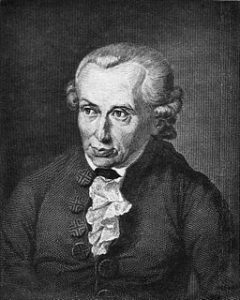 Let’s ask an “expert”. What would Immanuel Kant say about the Internet?
Let’s ask an “expert”. What would Immanuel Kant say about the Internet?
Markus Gabriel Interview: Kant und das Internet : Aufklärung braucht Zeit – und die fehlt im Netz (Kant and the Internet: Enlightenment takes time – and the Internet lacks it)
Florian Felix Weyh: DigiKant oder: Vier Fragen, frisch gestellt (DigiKant or: Four questions, freshly asked)Markus Gabriel Interview: Kant und das Internet : Aufklärung braucht Zeit – und die fehlt im Netz , in: FAZ http://www.faz.net/aktuell/feuilleton/debatten/digitales-denken/interview-kant-und-das-internet-aufklaerung-braucht-zeit-und-die-fehlt-im-netz-1912940.html 01.02.1010
Gabriel sees the Internet in Kant’s sense as an tool of enlightenment.
“What you do at Google is easy to understand with Kant. This is where information is filtered. Just as under Kant’s conditions you have an infinitely large pool of information, we call it with Kant the “thing in itself”. But this information pool is not directly accessible, there is a logical form in between, that would be Google search in this case.
Unlike Kant’s epistemology, however, we at Google see what is independent of these filters as an ideology-prone accumulation of random decisions. Though the Internet certainly has ding-it-yourself qualities – it is anonymous, unrecognizable, unmanageable – but we know that in the background there are ideological forces.”
The Page Rank algorithm, although ideologically shaped, was extremely sympathetic as a mathematical construct Kant.
Kant “, the window metaphoric on the Internet would have been familiar. He would have seen in him a complex copy of the entire rational structure: We have a sensuality, i. e. information input, we have understanding, rules and we have reason – whereby reason in Kant’s sense would correspond to the holding together of different sources of information. It comes into play when I ask myself: do I use Google, or do I take up another offer? Reason comes into play in the overview of the diversity of the Internet and the choice between different options.”
In principle, the Internet is suitable as an tool of enlightenment. The essential criterion of enlightenment, however, is “self-transparency”: the responsibility lies with the judge himself, who must understand the reasons for his judgment and defend it himself. However, the judge can get into an “overtaxing situation” due to the Internet.
Let us summarise the result: After that, it would therefore be sufficient to increase the judge’s media competence. But that’s the problem right now: most internet users are satisfied with the search results and consider their media competence to be sufficient due to the positive results of simple factual research.
Florian Felix Weyh: DigiKant oder: Vier Fragen, frisch gestellt, in: Deutschlandfunk 28.02.2016 http://www.deutschlandfunk.de/philosophie-in-der-digitalen-welt-digikant-oder-vier-fragen.1184.de.html?dram:article_id=342818
Weyh assumes that quantum physicists believe that matter is constituted on a quantum level:
“Information can’t be just what we learn about the world. It can be what the world’ does’. […] When a photon is absorbed and thus’ measured’ – until its absorption it has no reality – an indivisible information bit is added to what we know about the world, and at the same time the information bit determines the structure of a small part of the world. It’ creates’ the reality of time and space of this photon’.
Based on this, he examines the four questions that Immanuel Kant posed in his lectures on logic in 1765 and extrapolates the answers to a period until 2050.
What can I know?
Everything is accessible, but the crowd can only be mastered by machine. Science and citation is devalued. Information can no longer be validated, knowledge becomes timeless and boundless:”There are only agreements of truth with a moderate social bonding force: Whoever does not like an agreement, chooses another.” Conspiracy theories and pseudo-scientific explanations overgrow evidence-based approaches:”Thinking threatened to become anchorless until it was remembered that knowledge exists as an orientation power only where institutions provide secure fields of information and ignorance is resolutely excluded.”
What should I do?
In the future, submission to technology and disclosure of data will be complete. Complementary to the abandonment of the concept of freedom, the controllability of legal norms increases
“But since in the digital universe, when one gave his liberty in payment in order to be politically effective through the registration of all actions, one received a system of appropriately graduated sanction possibilities free of charge.”
So that the question can be answered:
“Give priority to one’s own only as long as it does not damage the general public. The advantage of the Second Enlightenment is that you get immediate feedback. While in the past one needed a moral sense of position – and often let it wither away – one now receives a position report, which informs one directly about one’s own wrong positions in society. And every disorder in the microstructure came back to be a disorder in the individual.”
What can I hope for?
“I can hope to become immortal. Since information is the foundation of our existence – “It from bit” – there can be no more death in the eternal record, only a deterioration of the biological carrier material.”
What is the human?
” The human being is based on information; knowing or not knowing it alone makes the difference.”
Weyh sees an inevitable development of the loss of man’s creator status:
“He went one step too far with digitization. She changed the human code in such a way that in the end man must lose his power, which he seemed to have gained through the machines in the meantime. He diffuses into an elusive entity, into a perhaps joyful we that can do without self.”
Let’s summarize: A gloomy prognosis, in which the existing attempts to evaluate information or to act with social media – including this website – only symptoms or transitional forms are up to this final stage.